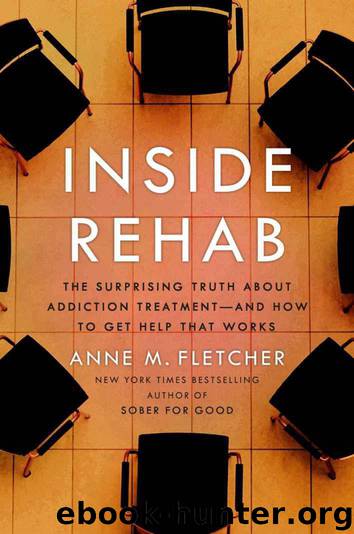Inside Rehab: The Surprising Truth About Addiction Treatment-And How to Get Help That Works by Anne M. Fletcher

Author:Anne M. Fletcher [Fletcher, Anne M.]
Language: eng
Format: epub, mobi
ISBN: 9780670025220
Publisher: VIKING ADULT
Published: 2013-02-07T00:00:00+00:00
TREATMENT ACCORDING TO DRUG OF CHOICE?
The going philosophy at most treatment programs seems to be that drugs differ, but recovery from addiction is the same, regardless of the drug involved. Until I started interviewing people who’d been to rehab, however, it hadn’t occurred to me how different and isolated some people can feel in rehab because of their particular drug addictions. Carrie G., who went to treatment numerous times for a heroin addiction, said, “Alcoholics feel terrific when they get sober. But I was on Suboxone [a brand name for a form of buprenorphine, which helps people withdraw from opioids] and felt terrible.”
Several other former rehab clients told me that they think rehabs should treat people according to their drug of choice. Wyatt D. said, “Every substance is different and the approach to treat them should be different. If they don’t know how to handle the monster they’re dealing with, it’s a waste. People on heroin and meth are completely different.”
Is there any evidence that treatment should be according to a person’s drug of choice? Most of the experts I consulted said that there isn’t, aside from what we know about medications that can help people according to their particular addiction. (For more on this, see chapter 9.) However, Dr. Kivlahan emphasized, “There’s evidence that people who remain engaged in care are more likely to have good outcomes. And those who feel different, alone, alienated, marginalized, or misunderstood in group-based treatment—whether it’s because of the severity of their drug addiction, having a different drug of choice than other group members, or some other reason—are not as likely to stay in treatment. But good counselors and programs should be able to balance treatment principles common to everyone—such as learning how to recognize and manage relapse triggers—with helping people manage individual recovery challenges.”
It occurred to me that “treatment by drug of choice” may be more of an early rehab issue. As mentioned in a previous chapter, I noticed that some people in residential rehab still seemed to be going through the detox process while participating in treatment. Former heroin addict Shelby W. said, “For me—and this is how it seems to be with most of the twelve-step programs—you have to go to classes all day long and you have to go to meetings every day. When still going through detox, to have mandatory schedules all day long was not what I wanted. It was too intense.” She added that they gave her medication to help with withdrawal, but not enough to be effective. She said, “You’re only in a hospital a few days for the really terrible part, but after that, you’re out into the groups and you feel completely lost and hopeless.”
At one program, a client privately commented to me that some people who were participating in treatment were “out of it” for a long time, and she didn’t think it was fair that this counted as part of their treatment. When I ran this by a staff person, he acknowledged
Download
Inside Rehab: The Surprising Truth About Addiction Treatment-And How to Get Help That Works by Anne M. Fletcher.mobi
This site does not store any files on its server. We only index and link to content provided by other sites. Please contact the content providers to delete copyright contents if any and email us, we'll remove relevant links or contents immediately.
| Adult Children of Alcoholics | Alcoholism |
| Drug Dependency | Gambling |
| Hoarding | Obsessive Compulsive Disorder (OCD) |
| Sexual | Smoking |
| Substance Abuse | Twelve-Step Programs |
The Hacking of the American Mind by Robert H. Lustig(3608)
Right Here, Right Now by Georgia Beers(3533)
Fingerprints of the Gods by Graham Hancock(3248)
Goodbye Paradise(3013)
Bad Pharma by Ben Goldacre(2752)
Happiness by Matthieu Ricard(2546)
More Language of Letting Go: 366 New Daily Meditations by Melody Beattie(2469)
The Social Psychology of Inequality by Unknown(2340)
Drugs Unlimited by Mike Power(2208)
The Plant Paradox by Dr. Steven R. Gundry M.D(2065)
Confessions of a Shopaholic by Sophie Kinsella(1892)
Borders by unknow(1805)
Make Love Not Porn by Cindy Gallop(1768)
Dry by Augusten Burroughs(1700)
Stop Being Mean to Yourself: A Story About Finding the True Meaning of Self-Love by Melody Beattie(1667)
Getting Off by Erica Garza(1635)
Yoga and the Twelve-Step Path by Kyczy Hawk(1549)
Weed, Inc. by Ben Cort(1525)
Unmasking Male Depression by Archibald D. Hart(1518)
